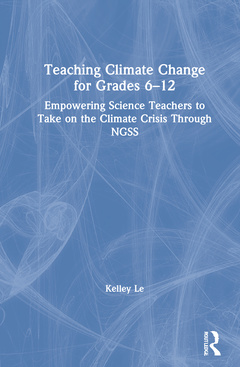Teaching Climate Change for Grades 6–12 Empowering Science Teachers to Take on the Climate Crisis Through NGSS
Auteur : Le Kelley

Looking to tackle climate change and climate science in your classroom? This timely and insightful book supports and enables secondary science teachers to develop effective curricula ready to meet the Next Generation Science Standards (NGSS) by grounding their instruction on the climate crisis.
Nearly one-third of the secondary science standards relate to climate science, but teachers need design and implementation support to create empowering learning experiences centered around the climate crisis. Experienced science educator, instructional coach, and educational leader Dr. Kelley T. Le offers this support, providing an overview of the teaching shifts needed for NGSS and to support climate literacy for students via urgent topics in climate science and environmental justice ? from the COVID-19 pandemic to global warming, rising sea temperatures, deforestation, and mass extinction. You?ll also learn how to engage the complexity of climate change by exploring social, racial, and environmental injustices stemming from the climate crisis that directly impact students.
By anchoring instruction around the climate crisis, Dr. Le offers guidance on how to empower students to be the agents of change needed in their own communities. A range of additional teacher resources are also available at www.empoweredscienceteachers.com.
Introduction
• A Pulse on the Current Climate
• A Moment to Reflect
• Beginning Where You Are
• Shared Leadership
• Purpose
• Overview of Chapters
• Learning Icons
• Trust the Process
PART 1: LOOKING BACK TO MOVE FORWARD
Chapter 1: Reenvisioning Science Teaching
• A Story About Tradition
• An Opportunity to Challenge Science Education
• Unveiling Your Teacher Disposition
• Who Said, "The Scientific Method?"
• Diving Deeper Into the Process of Science
• Getting Cozy With the Nature of Science
• Equity & Antiracist Science Teaching
• Putting the Pieces Together
Chapter 2: Leveraging the NGSS for Climate Change
• A Story About Root-Bound Plants
• A Second Look at the NGSS for Climate Science
• A Fresh Take on the NGSS
• The Role of Climate Literacy & NGSS
• Climate Change as a Socioscientific Issue
• Deeper Dive Into SSI
• Moving Forward With Confidence
PART 2: DEVELOPING SCIENTIFIC LITERACY USING CLIMATE SCIENCE
Chapter 3: Climate Change is Complex, Where do I Start?
• The Environmental & Climate Change Literacy Project Summit (ECCLPS)
• Public Attitudes Regarding Climate Change
• Identifying Your State of Mind
• Climate Science Fundamentals
• Earth’s Energy Budget
• Global Climate Change
• Earth’s Systems
• Multiple Carbon Cycles
• The Anthropocene
• Scientific Consensus on Climate Change
• Major Teaching Takeaways
Chapter 4: Climate Change as the Anchor
• Lessons About Bonsai Koi Fish
• 100Kin10 Predictions
• Asking More Questions
• Using SSI to Develop Scientific Literacy Skills
• Taking More Back to the Class
• Using Phenomena
• Finding Phenomena
• Anchoring Instruction on Climate Change Phenomena
PART 3: PRACTICES THAT BUILD CAPACITY FOR STUDENT AGENCY
Chapter 5: Planning & Teaching for Transformation
• A Vision for Science Education
• Overview of Storyline Design Components
• Student-Driven Instruction
• Launching Lessons With Phenomena
• Intentional Discourse Opportunities
• Developing Critical Thinkers in a Digital Age
• Bringing it Back
Chapter 6: Education for Climate Action
• Tips on Talking About Climate Change
• Big Problems Require Big Solutions
• Climate & Social Justice
• Resources that Build Student Capacity
• Gauging Student Progress
• Interactive Tools to Enhance Instruction
• Empowering Students to Take Action
• Concluding Remarks
Kelley T. Le, Ed.D., is currently the Director of the Science Project at UC Irvine, where she supports K-12 teachers, educational leaders, and school districts with science, engineering, and equity for justice-centered education.
Date de parution : 06-2021
15.2x22.9 cm
Date de parution : 06-2021
15.2x22.9 cm
Thèmes de Teaching Climate Change for Grades 6–12 :
Mots-clés :
Climate Change; climate science; Climate Crisis; environmental science; Climate Change Content; environmental education; Teach Climate Change; Next Generation Science Standards; NGSS; science education; Instructional Segments; environmental justice; Socioscientific Issues Framework; global warming; Stem Identity; Covid-19; AP; STEM education; Socioscientific Issues; Stem Field; Teaching Climate Science; Environmental injustices; Socioscientific Reasoning; Stem Policy; Earth’s Energy Budget; Stem Job; Current Professional Development Opportunities; Stem Teacher; Marine Carbon Cycle; Climate Science Education; Controversial SSI; Current Climate Change; Evidence Based Communication Strategies; Pursue Stem Career



